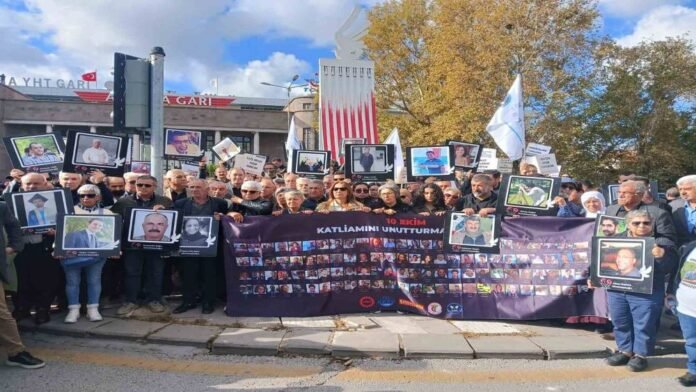Families of victims, opposition politicians and trade unions marked the 10th anniversary of Turkey’s deadliest terrorist attack on Thursday, gathering outside Ankara’s main train station to remember the 104 people killed in a 2015 suicide bombing carried out by the Islamic State group, Turkish Minute reported.
Relatives read the names of the dead aloud at 10:04 a.m., the exact time of the twin blasts that tore through a peace rally on October 10, 2015. They declared the victims “still alive” as hundreds observed a moment of silence in the square, the site of the Labor, Peace and Democracy rally that had called for an end to renewed fighting between Turkish forces and the outlawed Kurdistan Workers’ Party (PKK).
The commemoration was followed by an attempt to march to the Ankara Courthouse under the banner of a “Justice March.” Police blocked the route, fired tear gas and set up barricades, prompting a sit-in by families and supporters. After about 30 minutes the crowd dispersed.
“We are squeezed among the barriers. Have you no respect for the 104 people who lost their lives?” said Mehtap Sakinci, co-chair of the October 10 Peace Association, which represents survivors and relatives.
Among those attending were Tuncer Bakırhan, co-chair of the pro-Kurdish Peoples’ Equality and Democracy Party (DEM Party), and representatives of Turkey’s main opposition Republican People’s Party (CHP), along with civil society groups including the Confederation of Progressive Trade Unions (DİSK), the Confederation of Public Employees’ Unions (KESK), the Turkish Medical Association (TTB) and the Union of Chambers of Turkish Engineers and Architects (TMMOB).
Despite a series of trials in which Islamic State in Iraq and the Levant (ISIL) members received multiple life sentences, families say accountability remains elusive. Sixteen suspects remain at large, and no public officials have faced charges, even though internal reports showed police and intelligence services had prior warnings.
Earlier this week the Justice Ministry defended the state before Turkey’s Constitutional Court in response to a petition filed by survivors. The ministry argued there had been no actionable intelligence before the attack and said it was “not possible to completely prevent terrorist acts.” It warned that holding the state responsible would impose an “excessive burden” on public authorities. Families and their lawyers counter that officials ignored dozens of intelligence alerts and failed to secure the rally site.
Turkey’s Supreme Court of Appeals upheld life sentences against nine Islamic State members last year but confirmed that former intelligence and police officials would not face prosecution after the Ankara governor’s office refused to grant permission for an inquiry.
The bombing took place during a period of heightened political tension. Four months earlier, President Recep Tayyip Erdoğan’s ruling Justice and Development Party (AKP) had lost its parliamentary majority in national elections. A fragile peace process with the PKK collapsed that summer, and both ISIL and PKK attacks surged.
For families, the lack of accountability has become part of the legacy of the attack. “Peace in this country will not be truly established until justice is served for these 104 people,” Sakinci said.















